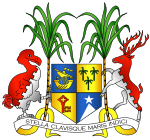
Back Politique à Maurice French Ustrój polityczny Mauritiusa Polish Política da Maurícia Portuguese Государственный строй Маврикия Russian மொரிசியசில் அரசியல் Tamil Ìṣèlú ilẹ̀ Mọ́rísì Yoruba
 |
|---|
| Constitution |
Politics of Mauritius (French: Politique à Maurice) takes place in a framework of a parliamentary democracy. The separation of powers is among the three branches of the Government of Mauritius, namely the legislative, the executive and the Judiciary, is embedded in the Constitution of Mauritius. Being a Westminster system of government, Mauritius's unicameral house of parliament officially, the National Assembly, is supreme. It elects the President and the Prime Minister. While the President is voted by a single majority of votes in the house, the Prime Minister is the MP who supports a majority in the house. The President is the Head of State while the prime minister has full executive power and is the Head of Government who is assisted by a council of Ministers. Mauritius has a multi-party system.[1] The Economist Intelligence Unit rated Mauritius a "full democracy" in 2022.[2]
Historically, Mauritius's government has been led by the Labour Party or the MSM for the exception of short periods from 1982 to 1983 and 2003–2005 where the MMM was at the head of the country. L'Alliance Lepep, a coalition of several political parties including MSM, Muvmen Liberater and PMSD, won the 2014 elections.[3] Two years into the political term, the PMSD announced their resignation from the coalition government on 19 December 2016, and joined the ranks of the opposition.[4][5] On 23 January 2017, the then prime minister, 86-year-old Sir Aneerood Jugnauth,[6] a key political figure in Mauritian politics who has previously served several political terms spanning over many decades, announced that he was stepping down as prime minister.[7] Following the Westminster tradition, the leader of the governing party (MSM party) in the coalition government, Pravind Jugnauth who is Sir Aneerood Jugnauth's son and then Minister of Finance, was sworn in as prime minister.[7] Although Sir Aneerood Jugnauth resigned as prime minister, he is still serving as Minister Mentor, Minister of Defence, Minister for Rodrigues.[6] Mauritius' ruling Militant Socialist Movement (MSM) won more than half of the seats in 2019 parliamentary election, securing incumbent prime minister Pravind Kumar Jugnauth a new five-year term.[8]
- ^ "FAQs – What is the political system in Mauritius ?". Government of Mauritius. Archived from the original on 2 January 2013. Retrieved 5 January 2013.
- ^ "Democracy Index 2022: Frontline democracy and the battle for Ukraine" (PDF). Economist Intelligence Unit. 2023. Retrieved 9 February 2023.
- ^ "Electoral Commissioner's Office – Detailed Results by Constituency". electoral.govmu.org. Archived from the original on 28 February 2017. Retrieved 27 February 2017.
- ^ "From opposing to proposing". Defimedia (in French). 23 December 2016. Archived from the original on 28 February 2017. Retrieved 27 February 2017.
- ^ Deborah (19 December 2016). "Le PMSD quitte l'alliance Lepep !". News you can trust. Archived from the original on 28 February 2017. Retrieved 27 February 2017.
- ^ a b "National Assembly – Jugnauth Anerood". mauritiusassembly.govmu.org. Archived from the original on 28 February 2017. Retrieved 27 February 2017.
- ^ a b "Mauritius: PM Anerood Jugnauth to hand over to son". BBC News. 22 January 2017. Archived from the original on 2 February 2017. Retrieved 27 February 2017.
- ^ "Mauritius elects incumbent PM for five-year term | Reuters". Reuters. 8 November 2019.
© MMXXIII Rich X Search. We shall prevail. All rights reserved. Rich X Search